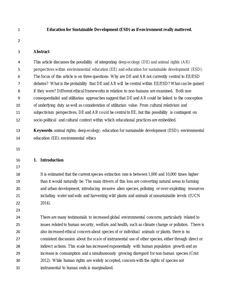This paper discusses sustainable real estate and the role of ethics within real estate. Both terms ‘sustainability’ and ‘ethics’ needs an explanation. With this discussion the tripartite system of ‘morals – principles - laws’ is described in order to have more grip on sustainable real estate and ethics.
MULTIFILE

This paper discusses sustainable real estate and the role of ethics within real estate. Both terms ‘sustainability’ and ‘ethics’ needs an explanation. With this discussion the tripartite system of ‘morals – principles - laws’ is described in order to have more grip on sustainable real estate and ethics.
DOCUMENT

This article discusses the possibility of integrating deep ecology (DE) and animal rights (AR) perspectives within environmental education (EE) and education for sustainable development (ESD). The focus of this article is on three questions: why are DE and AR not currently central to EE/ESD debates? What is the probability that DE and AR will be central within EE/ESD? What can be gained if they were? Different ethical frameworks in relation to non-humans are examined. Both non-consequentialist and utilitarian approaches suggest that DE and AR could be linked to the conception of underlying duty as well as consideration of utilitarian value. From cultural relativism and subjectivism perspectives, DE and AR could be central to EE, but this possibility is contingent on socio-political and cultural context within which educational practices are embedded. https://doi.org/10.1016/j.envdev.2014.09.001 https://www.linkedin.com/in/helenkopnina/
MULTIFILE

Presentation SECREV 2022
DOCUMENT
Presentation Nederlandse Vereniging voor Criminologie Congres 2022
DOCUMENT
A discussion of the inherent biases in data that reproduce and arguably strengthen system prejudices
DOCUMENT
Like the professionals, design students tend to avoid the complexity of the user context, and moral issues are largely overlooked. This inspired us to explore whether we could engage design students in thinking about moral issues by exploring different ethical frameworks in their designing. As a case environment we chose smart-grid product service combinations. In this paper we first discuss the ethical frameworks of four selected philosophers’: Plato, Rousseau, Kant, & Mill. Then we will describe the student design process, the resulting four smart grid service concepts and the user insights that came from a user evaluation. We discuss how this approach allowed the students to get insights in their own ethical stance and how they allowed users to reflect on possible futures. We also discuss how these ‘probing’ concepts were used within the larger smart grid project.
DOCUMENT

The focus of the present study is the extent to which an internship or study abroad contributes to students’ development of international competencies, such as interpersonal and intercultural competencies, foreign language skills, and international academic and professional competencies.
DOCUMENT
